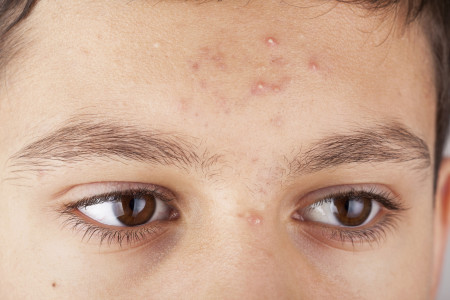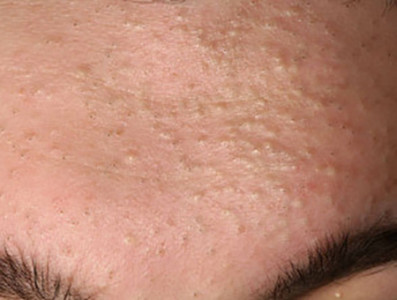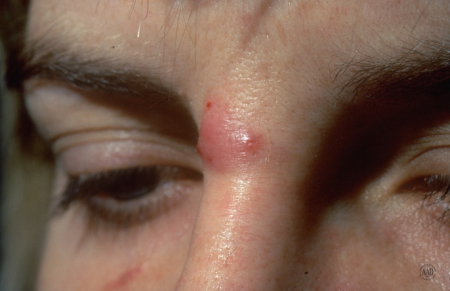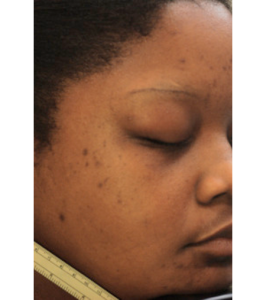Do you need a Dermatology appointment?
Acne Treatment for all Ages
Most people at some point in their lives have had to seek acne treatment. Acne is the most common skin condition in the United States. Although it’s common, there is a lot of misinformation about acne, acne treatment and treating acne scars. Time to learn the correct information and when you should contact a Dermatologist.
Acne signs
Many people think that acne is just pimples. But a person who has acne can have any of these blemishes:
- Blackheads
- Whiteheads
- Papules
- Pustules (what many people call pimples)
- Cysts
- Nodules
Acne can appear on the back, chest, neck, shoulders, upper arms and buttocks.
The following describes how each of these breakouts develops, and pictures show what they look like.
Whiteheads
Picking at whiteheads can lead to more whiteheads and acne scars, so dermatologists recommend that you treat whiteheads with an acne treatment instead of picking at them.
Medical name: Closed comedo, which means “closed pore.”
Blackhead
Dermatologists recommend treating this type of acne with a retinoid, as squeezing a blackhead can cause an infection or permanent scar.
Why are blackheads black? Many people mistakenly believe the black speck is dirt. What you’re really seeing is a chemical reaction. When the buildup inside the pore reacts with oxygen in the air, the black color appears. This reaction is similar to what happens when a cut-up apple turns brown. Medical name: Open comedo, which means “open pore.”


If you have a few pimples, you can often successfully treat these with an acne product that contains benzoyl peroxide, retinoid, or azelaic acid. Sometimes excess oil, dead skin cells, and bacteria get trapped inside a pore. The bacteria, which are normally found on our skin, can multiple quickly in the excess oil. As the pore fills with bacteria, inflammation (swelling) develops and a pimple appears.
Medical name: If the pimple contains pus, it’s called a pustule. A pimple without pus is called a papule.
Acne nodules or cysts
If you have an extremely painful acne cyst or nodule, a dermatologist can inject it with medication to reduce the pain and help it clear more quickly.
The main difference between an acne nodule and an acne cyst is that a cyst contains pus. Because nodules don’t contain pus, they feel harder to the touch than do cysts.
More women getting acne
Not just teens have acne. A growing number of women have acne in their 30s, 40s, 50s, and beyond. This happens for many reasons and can be particularly frustrating.
Why treat acne?
Myths about acne are as common as the skin problem. One common myth is that you have to let acne run its course and then treat acne scars. Dermatologists know this is not always the best advice.
Here’s why:
- Without treatment, dark spots and permanent scars can appear on the skin as acne clears
- Treating acne often boosts a person’s self-esteem
- Many effective treatments are available from skin clearing facials to skincare products
Why dermatologists recommend treating acne
While acne will eventually go away on its own, dermatologists recommend treating acne for these reasons:
You avoid years of breakouts. Acne can last a long time. Most teenage boys who have acne will continue to have breakouts until they are 20 to 25 years old. A teenage girl can expect her acne to last into her 20s or longer. About 5% of women continue to have acne in their 40s.
You prevent worsening acne. Left untreated, acne can worsen. What starts out as a few pimples can progress to widespread blackheads, whiteheads, and deep, painful pimples. There’s no way to know if this will happen to you. However, you have a greater risk if a close blood relative had deep, painful acne that left permanent acne scars.
If acne becomes severe, it can diminish self-esteem. Many research studies have shown that people who have severe acne tend to have higher rates of depression and anxiety than do people without acne.
You sidestep possible acne scars. All types of acne from blackheads to deep, painful nodules can cause scarring. Acne scars can be permanent. By treating acne early before it worsens, you can prevent these scars.
Acne can cause more than breakouts
Some people dismiss acne as a skin condition that you’ll eventually outgrow, but it can have a profound and lasting effect on someone’s life. Many people develop one or more of the following after getting acne.
Acne scars: When an acne breakout clears, it can leave a permanent scar. Some scars cause depressions in the skin. Others are raised. It’s impossible to predict who will develop scars when the acne clears, but the following increases your risk:
- Living with acne for an extended amount of time because you don’t treat it or treatment doesn’t work
- Having one or more close blood relatives who developed acne scars
Dark spots on the skin: As an acne breakout clears, some people see a spot where the acne once was. This completely flat spot can be
As the acne clears, it can leave long-lasting dark spots on the skin. Unlike acne scars, these spots may eventually clear on their own.
Clearing can take time, though. Some spots can last for a year or longer. The darker the spot, the longer it will take to clear. Treatment and the right skin care can help clear the spots more quickly and prevent new dark spots.
You’ll find out how you can treat and prevent these dark spots in skin of color at: 10 tips for clearing acne in skin of color.
The medical name for these spots is post inflammatory hyperpigmentation (PIH).
Lower self-esteem: Research shows that acne can deflate one’s self-esteem, and dermatologists see this in many patients who have acne. Lower self-esteem during the teen and early adulthood years can negatively affect one’s life.
For example, lower self-esteem can prevent someone from pursuing a desired career, speaking up in class, getting a part-time job, making friends, or dating.
Low self-esteem is also associated with anxiety and depression.
Treating acne rather than letting it run its course can prevent lowered self-esteem.
Depression: Studies reveal that teens with acne have a higher risk of developing depression, which may include thoughts of suicide, than do teens who have the occasional pimple. This is why dermatologists recommend treating acne when it begins and continuing treatment to prevent new breakouts.
While few people escape acne during their teenage years, some people are more likely to develop deep, painful pimples that leave scars.
How do dermatologists treat acne?
Today, there are many effective acne treatments. Different types of acne treatments work for different types of people. That is where advice from your Dermatologist comes in.
People who have mild acne have a few blemishes. They may have whiteheads, blackheads, papules, and/or pustules (aka pimples). Many people can treat mild acne with products that you can buy without a prescription. A product containing benzoyl peroxide or salicylic acid often clears the skin.
Despite the claims, acne treatment does not work overnight. At-home treatment requires four to eight weeks to see improvement. Once acne clears, you must continue to treat the skin to prevent breakouts.
When to see a dermatologist
If you have a lot of acne, cysts, or nodules, a medicine that you can buy without a prescription may not work. If you want to see clearer skin, you should see a dermatologist. Dermatologists offer the following types of treatment:
Acne treatment that you apply to the skin: Most acne treatments are applied to the skin. Your dermatologist may call this topical treatment. There are many topical acne treatments. Some topicals help kill the bacteria. Others work on reducing the oil. The topical medicine may contain a retinoid, prescription-strength benzoyl peroxide, antibiotic, or even salicylic acid. Your dermatologist will determine what you need.
Acne treatment that works throughout the body: Medicine that works throughout the body may be necessary when you have red, swollen types of acne. This type of treatment is usually necessary to treat acne cysts and nodules. Your dermatologist may prescribe one or more of these:
- Antibiotics (helps to kill bacteria and reduce inflammation).
- Birth control pills and other medicine that works on hormones (can be helpful for women).
- Tretinoin – Available in our Revive Medical Spa, LLC in varying strengths with the advice of your Dermatologist
Procedures that treat acne: Your dermatologist may treat your acne with a procedure that can be performed during an office visit. These treatments include:
- Lasers and other light therapies: AviClear is the newest approved device to treat the cause of acne. These devices reduce the P. acnes bacteria. Your dermatologist can determine whether this type of treatment can be helpful.
- Chemical peels: You cannot buy the chemical peels that dermatologists use. Dermatologists use chemical peels to treat two types of acne—blackheads and papules.
- Acne removal: Your dermatologist may perform a procedure called “drainage and extraction” to remove a large acne cyst. This procedure helps when the cyst does not respond to medicine. It also helps ease the pain and the chance that the cyst will leave a scar. If you absolutely have to get rid of a cyst quickly, your dermatologist may inject the cyst with medicine.
Outcome
Waiting for acne to clear on its own can be frustrating. Without treatment, acne can cause permanent scars, low self-esteem, depression, and anxiety.
To avoid these possible outcomes, dermatologists recommend that people treat acne. When the skin clears, treatment should continue. Treatment prevents new breakouts. Your dermatologist can tell you when you no longer need to treat acne to prevent breakouts.
Another option to treat acne without drugs is the AviClear Laser. This revolutionary treatment treats the cause of acne in as little as 3 treatments.
Treating skin after acne has cleared
Your skin may have dark spots and scars once the acne has been cleared. We recommend booking a Skincare Consultation with one of our Aestheticians to discuss your options to getting clear, glowing skin back. Some available treatments are: Genius RF Microneedling, Chemical Peels, Laser Treatments, and SkinPen, Microneedling to name a few treatment options.




